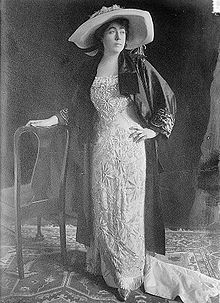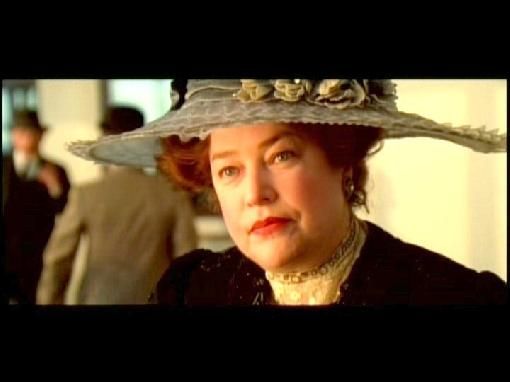Margaret Brown (nèe Tobin) (July 18, 1867 – October 26, 1932) was an American socialite, philanthropist, and activist who became famous due to her involvement with the 1912 sinking of the RMS Titanic, after exhorting the crew of lifeboat 6 to return to look for survivors. It is unclear whether any survivors were found after life boat 6 returned to search. She became known after her death as “The Unsinkable Molly Brown”, although she was not called Molly during her life. Her friends called her Maggie.
Born Margaret Tobin in Hannibal, Missouri, one of four children born to Irish immigrants John Tobin (1820-1899) and Johanna Collins (1825-1905). Her siblings were Daniel (born 1863), William (born 1869), and Helen (born 1871). Added to these, Margaret had two half-sisters: Catherine Bridget Tobin, by her father’s first marriage, and Mary Ann Collins, by her mother’s first marriage. Both her mother and father had been widowed young.
At age 18, Margaret relocated to Leadville, Colorado with her sister, and got a job in a department store. It was here she met and married James Joseph Brown (1854-1922), nicknamed J.J., an enterprising, self-educated man. His parents, too, had emigrated from Ireland. Brown had always planned to marry a rich man but she married J.J. for love. She said,
I wanted a rich man, but I loved Jim Brown. I thought about how I wanted comfort for my father and how I had determined to stay single until a man presented himself who could give to the tired old man the things I longed for him. Jim was as poor as we were, and had no better chance in life. I struggled hard with myself in those days. I loved Jim, but he was poor. Finally, I decided that I’d be better off with a poor man whom I loved than with a wealthy one whose money had attracted me. So I married Jim Brown.
Margaret and J.J. were married in Leadville’s Annunciation Church on September 1, 1886. The Browns had two children.
The family acquired great wealth when J.J.’s engineering efforts proved instrumental in the production of a substantial ore seam at the Little Jonny mine of his employers, Ibex Mining Company, and he was awarded 12,500 shares of stock and a seat on the board.
In Leadville, Margaret first became involved with the women’s suffrage issue, helping to establish the Colorado chapter of the National American Woman Suffrage Association and working in soup kitchens to assist miners’ families.
During 1894, the Browns moved to Denver, Colorado, which gave the family more social opportunities. Margaret became a charter member of the Denver Woman’s Club, whose mission was the improvement of women’s lives by continuing education and philanthropy. During 1901, she was one of the first students to enroll at the Carnegie Institute in New York. Adjusting to the trappings of a society lady, Brown became well-immersed in the arts and fluent in the French, German, and Russian languages. During 1909 she advertised herself as campaigning for the U.S. Senate.
Margaret assisted in the fundraising for Denver’s Cathedral of the Immaculate Conception which was completed during 1911. Margaret worked with Judge Lindsey to help destitute children and establish the United States’ first juvenile court which helped form the basis of the modern U.S. juvenile courts system.
Margaret campaigned for Senate again during 1914 but stopped when her sister Helen married a German baron, with Margaret believing that the union would have made a successful campaign impossible.
By the time Margaret Tobin Brown boarded Titanic at Cherbourg, France, she had already made a significant impact in the world. She and her daughter Helen, who was a student at the Sorbonne, had been traveling throughout Europe and were staying with the John Jacob Astor party in Cairo, Egypt, when Margaret received word that her first grandchild, Lawrence Palmer Brown, Jr., was ill. She decided to leave for New York immediately, and booked passage on the earliest ship: Titanic. At the last minute Helen decided to stay behind in London. Due to her quick decision, very few people, including family, knew that Margaret was on board the Titanic.
After the ship struck the iceberg, Margaret helped load others into lifeboats and eventually was forced to board lifeboat six. She and the other women in lifeboat six worked together to row, keep spirits up, and dispel the gloom that was broadcast by the emotional and unstable Robert Hichens. However, Margaret’s most significant work occurred on Carpathia, where she assisted Titanic survivors, and afterwards in New York. By the time Carpathia reached New York harbor, Margaret had helped establish the Survivor’s Committee, been elected as chair, and raised almost $10,000 for destitute survivors. Margaret’s language skills in French, German, and Russian were an asset, and she remained on Carpathia until all Titanic survivors had met with friends, family, or medical/emergency assistance. In a letter to her daughter shortly after the Titanic sinking, she wrote:
“After being brined, salted, and pickled in mid ocean I am now high and dry… I have had flowers, letters, telegrams-people until I am befuddled. They are petitioning Congress to give me a medal… If I must call a specialist to examine my head it is due to the title of Heroine of the Titanic.”
Her sense of humor prevailed; to her attorney in Denver she wired:
“Thanks for the kind thoughts. Water was fine and swimming good. Neptune was exceedingly kind to me and I am now high and dry.”
On May 29, 1912, as chair of the Survivor’s Committee Margaret presented a silver loving cup to Captain Rostron of the Carpathia and a medal to each Carpathia crew member. In later years Margaret helped erect the Titanic memorial that stands in Washington, D.C.; visited the cemetery in Halifax, Nova Scotia, to place wreaths on the graves of victims; and continued to serve on the Survivor’s Committee. She was particularly upset that, as a woman, she was not allowed to testify at the Titanic hearings. In response she wrote her own version of the event which was published in newspapers in Denver, New York, and Paris.



 The actor Kathy Bates, who portrayed Margaret “Molly” Brown in the movie Titanic, bears an uncanny resemblance to Margaret Brown.
The actor Kathy Bates, who portrayed Margaret “Molly” Brown in the movie Titanic, bears an uncanny resemblance to Margaret Brown.
Recent Comments